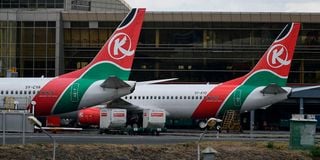Premium
Kenya Airways shares suspension extended for another year

A photo taken on November 5, 2022, shows Kenya Airways planes at the JKIA parking bay.
The Capital Markets Authority (CMA) has extended a share trading freeze on Kenya Airways for another 12 months to enable the airline to complete its operational and corporate restructuring.
The national carrier has been restructuring its business since July 2020, when the shares were first suspended from trading, at a time when MPs began to review the law that would pave the way for the state to take back full control of the airline. The nationalisation plan has since been dropped.
"The extension of suspension from trading the company’s shares will remain in force for an additional twelve (12) months, with effect from January 5, 2023. All shareholders, investors and the general public are asked to take note of the suspension," CMA said in a statement on Wednesday.
The government owns a 48.9 per cent stake in Kenya Airways, while Air France-KLM, which has opted to exit, owns 7.8 per cent.
In December, President William Ruto made a pitch to sell the government's stake in the national carrier to US investors in a bid to help return the troubled airline to profitability. He met with top executives of Delta Air Lines during his first US trip as president.
“I’m willing to sell the whole of Kenya Airways,” Dr Ruto told Bloomberg News at the time.
KQ reported a Sh9.8 billion half-year loss in August last year, a better performance than the Sh11.48 billion loss it recorded in the same period in 2020.
The airline has been surviving on State bailouts since the Covid-19 pandemic.





